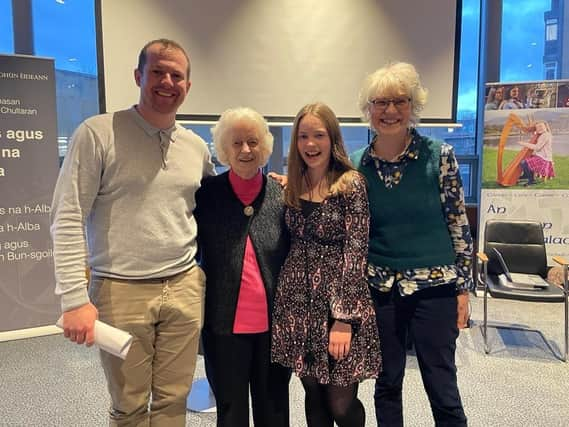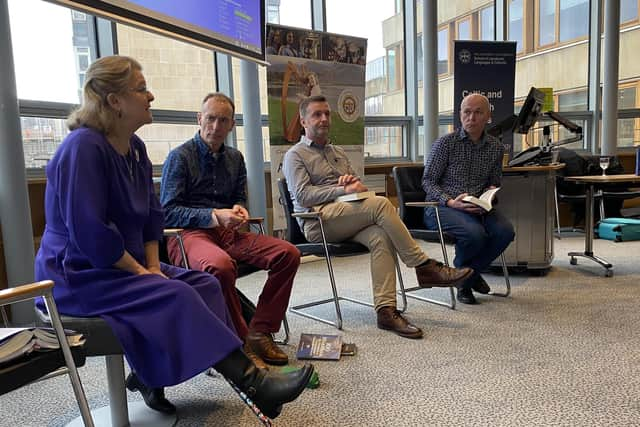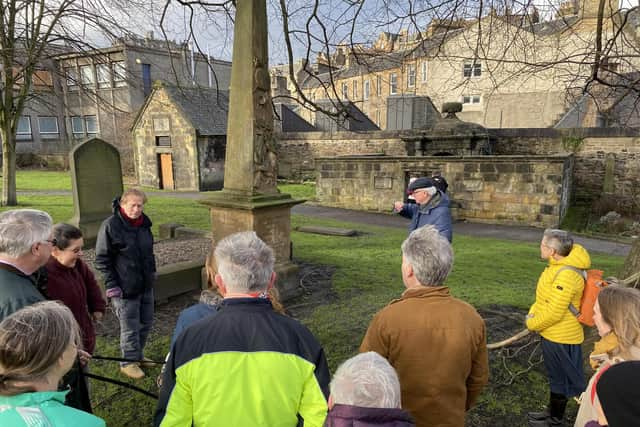Fitting Fèill in honour of diligent campaigner


John MacLeod was born in Carloway, the Isle of Lewis, in 1951. In 1970, after graduating from the Nicolson Institute, he came to Edinburgh, where he would spend the rest of his life, and entered the police service. In 1976, he earned a Scottish National Higher Certificate in Police Studies from Napier College, and in 1984, an LL.B. from the University of Edinburgh School of Law. After a distinguished career in the police, John retired in 2000.
John MacLeod had a life-long love for and devotion to his native language and culture, and contributed hugely to the Gaelic community both locally in Edinburgh and nationally. John was strongly committed to Gaelic-medium education, and acted as chairperson of Comann nam Pàrant’s local branch in Edinburgh and, later, as national chairperson. He served on the board of Comunn na Gàidhlig and, later, on Bòrd na Gàidhlig.
Advertisement
Hide AdAdvertisement
Hide AdJohn also had a deep interest in and love for Gaelic music. He was a member of two Gaelic choirs, Còisir Ghàidhlig Lodainn (the Lothian Gaelic Choir) and Còisir Ghàidhlig Chàrlabhaigh (the Carloway Gaelic Choir). He was Gaelic advisor to Comunn na Clàrsaich and was involved in organisation of the annual Edinburgh International Harp Festival. In the 1990s, he was instrumental in reviving the local Mòd in Edinburgh, and between 2007 and 2017, John served with great distinction as President of An Comunn Gàidhealach.


As important as John’s work on committees was, there were myriad other ways in which he contributed to the Gaelic community. Some talked of the help he would give to learners, or how he would work on the intricacies of precenting the Psalms with those keen to learn that tradition. John would undoubtedly have been proud of his children Màiri and Calum, who precented at the Gaelic service at Greyfriars.
John often worked behind the scenes, as translator and as an interpreter at various events, or delivering Gaelic news bulletins, or providing quiet advice in relation to some aspect of Gaelic development.
Shortly after John’s death in 2018, James Graham and Allan Campbell of An Comunn approached us at the University of Edinburgh with the idea of holding an annual lecture in honour of John MacLeod. We agreed on the spot, and the annual John MacLeod memorial lecture at Edinburgh University was born. It was agreed that the lecturer should be a young Gaelic speaker, as John saw young people as the key to the language’s future.
Advertisement
Hide AdAdvertisement
Hide AdThis year’s lecture, held at the university on the evening of 1 February, was given by Katie MacInnes.


A native of Lochs who is now based in Stornoway, Katie is co-owner of ASTAR, a Gaelic projects agency. In her lecture, entitled “Aon Chroit, Iomadh Chothrom” (“One Croft, Many Opportunities”), Katie reflected on opportunity and progress in the Gaelic community as it was in the past and how it is today.
Her lecture was the sixth in the series. Previous annual lectures were given by Kate Forbes MSP, the inaugural lecturer in 2019, Dr Alasdair Whyte, Pàdruig Morrison, Iona Whyte, and Ruairidh Alastair MacLennan. As in past years, John’s widow, Christine, as well as Màiri and Calum, were guests of honour.
Given the success of the lecture series, An Comunn and colleagues in Celtic & Scottish Studies thought it would be a fitting tribute to John to build on the lecture by adding a series of other events in John’s memory, and the result is the annual John MacLeod Memorial Festival, Fèill Chuimhneachaidh Iain MhicLeòid.
Advertisement
Hide AdAdvertisement
Hide AdLast Friday, following the lecture, Gillebride MacMillan, lecturer in Gaelic at Glasgow University and a highly respected singer and writer from South Uist, together with Martin MacIntyre, the University of Edinburgh’s inaugural Gaelic writer in residence, hosted a writing workshop, ‘A’ Sgrìobhadh Òran, A’ Dèanamh Rann’ (‘Writing a Song, Making a Verse’).
This was followed by a presentation on a new major collection of Gaelic poetry composed by recipients of An Comunn’s bardic crown, ‘100 Bliadhna de Bhàird a’ Chomuinn Ghàidhealaich, 1923-2023’, published last year by Clàr. Gillebride MacMillan, the editor of the collection, was joined by the incumbent Bàrd of An Comunn, Sandy MacDonald Jones, and two other crowned bards, Niall O’Gallagher and Martin MacIntyre.
Sandy spoke about why the collection was put together, and Gillebride talked about the history of the Bardic Crown. Then, each of the four poets read their contribution to the book—Sandy, a fine singer, sang her entry—and then read one of the other poems.
Friday afternoon concluded with presentations on another new book, ‘Gun Sireadh, Gun Iarraidh—The Tolmie Collection’, published by Acair. Edited by Kenna Campbell and Ainsley Hamill, the book is an expanded edition of the important collection of Gaelic songs made in the nineteenth century by Frances Tolmie (1840-1926) of the Isle of Skye, which had been first published in the Journal of the Folk-song Society in 1911.
Advertisement
Hide AdAdvertisement
Hide AdDr Priscilla Scott provided an excellent overview of Tolmie’s life and work, and Kenna spoke of the work she had done on the collection. Kenna, James Graham, and Màiri Callan then performed several songs from the Tolmie collection.
On Friday evening, in collaboration with An Comunn and the University of Edinburgh, Bothan Dhùn Èideann, which organises monthly gatherings for Gaelic-speakers in the Capital, hosted a special evening of song and music as part of the Festival.
The audience was treated to an impressive range of Gaelic songs from three Edinburgh University students, Màiri Callan, who recently graduated from the university’s music programme and who won the women’s Gold Medal at the 2021 Royal National Mòd, Alice MacMillan of Point, Lewis, who won the women’s Traditional Gold Medal in 2022, and Laura Robertson of Fort William, both of whom are currently enrolled on the MA in Primary Education with Gaelic.
Each is also a talented instrumentalist, and Màiri played some selections on the clàrsach, Alice on the fiddle, and Laura on the Highland bagpipe. James Graham, CEO of An Comunn, who himself won the Men’s Gold Medal in 2007, as well as the BBC Scotland Young Traditional Musician of the Year in 2004, also performed a fine set of songs.
Advertisement
Hide AdAdvertisement
Hide AdThe great Gaelic poet Duncan Bàn MacIntyre was born 300 years ago this year, and there was a series of events on Saturday to mark this important anniversary. Dr Anja Gunderloch of the Department of Celtic & Scottish Studies at the University of Edinburgh gave a wide-ranging presentation on Duncan Bàn’s poetry in print. A native of Glenorchy, Duncan Bàn came to Edinburgh in about 1766 to work in the city guard, the predecessor to the modern police force, and he spent much of the rest of his life in the Capital. Dr Gunderloch discussed the importance of Edinburgh in the history of Gaelic publishing, including the publication of Duncan Bàn’s verse, and the vibrant Gaelic community in Edinburgh which existed during Duncan Bàn’s time in the city.
Prof. Rob Dunbar gave a talk on the impact of Duncan Bàn’s poetry in Canada. He noted the importance of collectors such as John Lorne Campbell, MacEdward Leach, and especially Dr John Shaw in recording Duncan Bàn’s songs from Nova Scotia Gaelic tradition-bearers, and played a number of these recordings.
Dr Gunderloch and Prof. Dunbar then conducted a walking tour of sites connected with Duncan Bàn in Edinburgh’s Old Town. Stops included the monument to the poet in Greyfriars Kirkyard, where in 1812 he was buried, the White Hart Tavern in the Grassmarket, where the city’s Gaels would gather in Duncan Bàn’s time, the site on Johnston Terrace of the Gaelic chapel, founded in 1769, where Duncan and other Edinburgh Gaels worshipped, and Roxburgh Close, where an Historic Scotland plaque marks the spot where Duncan Bàn lived.
Saturday concluded with an event hosted by Comunn Tìr nam Beann, again in collaboration with An Comunn and the university. Andrew MacIntrye performed two sets on the Highland Bagpipe, Fraser Fifield, the University of Edinburgh’s Traditional Musician in Residence, treated the audience to a rich and varied set of music on the saxophone, the Scottish small pipes, and whistles, and the band Ceilidh Dachaigh performed a lively set of tunes and songs.
Advertisement
Hide AdAdvertisement
Hide AdFittingly, given John MacLeod’s interest in choral music and in Gaelic education, the Falkirk Junior Gaelic Choir and Mary McLean performed a selection of Gaelic songs. Several members of the choir were educated through the medium of Gaelic at Condorrat Primary School and Greenfaulds High School, both in Cumbernauld.
The Festival concluded on Sunday afternoon with the Gaelic service at Greyfriars. John MacLeod was a man of deep Christian faith, and the service was a fitting conclusion to several days of events in his honour.